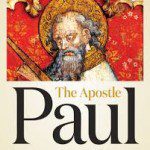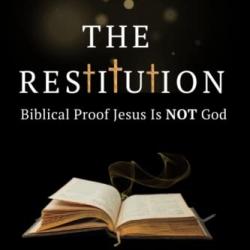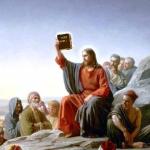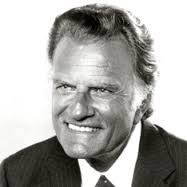 I think Billy Graham was the greatest man of God in the twentieth century. Not only was he such a gifted evangelist, a handsome man, and a friendly person who had a charming Southern accent, there was never any scandal with Billy Graham. He was a family man, a righteous man, and thus a devout follower of the one he constantly preached about—Jesus of Nazareth.
I think Billy Graham was the greatest man of God in the twentieth century. Not only was he such a gifted evangelist, a handsome man, and a friendly person who had a charming Southern accent, there was never any scandal with Billy Graham. He was a family man, a righteous man, and thus a devout follower of the one he constantly preached about—Jesus of Nazareth.
Billy Graham knew and ministered to many world leaders. They included U.S. presidents such as Richard Nixon. Then the Watergate scandal happened. Revelations of tape recordings of some of President Nixon’s private conversations were then made public. Besides being caught lying, he uttered a lot of foul language. Nixon then resigned his presidency as Congress was conducting an impeachment process against him. Graham then publicly apologized for having endorsed Nixon for president. But that’s about all the dirt you can get on this famed evangelist.
I knew Billy Graham. Billy spoke to our PGA Tour Bible Study four different times. And I was so grateful that he endorsed my first book, The Gospels Interwoven (1987). So many people believed in Jesus through Billy Graham’s preaching of the gospel. (To hear me speak about some of my experiences with Billy Graham, see the beginning of my 45-minute speech on the Internet entitled, “Does the Bible Identify Jesus As God?”) by simply searching with my name.
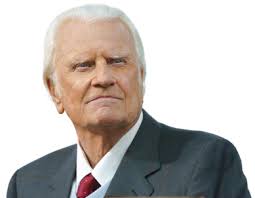 In the latter part of Billy Graham’s ministry, thus when he was older and perhaps wiser, he spoke repeatedly and publicly about having two regrets in his personal life. The first was that some of his children resented that their father had been gone from home so much, conducting his crusade work, when they were young and growing up. They had wanted their father be with them more. Billy admitted that if he had his life to do over, he would have had fewer crusades for this reason. Billy’s second regret was that he said he would have studied the Bible more. It is to this second regret that I will direct part of this critique.
In the latter part of Billy Graham’s ministry, thus when he was older and perhaps wiser, he spoke repeatedly and publicly about having two regrets in his personal life. The first was that some of his children resented that their father had been gone from home so much, conducting his crusade work, when they were young and growing up. They had wanted their father be with them more. Billy admitted that if he had his life to do over, he would have had fewer crusades for this reason. Billy’s second regret was that he said he would have studied the Bible more. It is to this second regret that I will direct part of this critique.
During the early part of Billy Graham’s ministry, he preached an Easter message that his radio and television ministry, “The Hour of Decision,” filmed and still makes available. I received it in an email yesterday from the Billy Graham Evangelistic Association. The title of this message is, “The Three Most Momentous Days in Human History.” The film begins with Billy’s two primary associates in his ministry—Cliff Barrows and George Beverly Shea—in conversation. Then Mr. Shea sings with his rich bass voice, “Were You There When They Crucified My Lord?” What a beautiful song, especially as sung by Mr. Shea, and one so appropriate for the occasion.
Then Billy Graham delivers his Easter message lasting about twenty minutes. He begins by briefly recounting world problems and then stating the title of his message. He says the three most momentous days were when Jesus died on the cross on Friday, Saturday elapsed, and on Sunday morning he arose from the dead. So far, so good.
Then Billy says Jesus’ disciples “dispersed all over the whole land,” surely referring to the land of Israel. This is a minor mistake. Perhaps Mr. Graham would not have made this gaff about history later in his ministry. He was young, and we’re all learning as we go. For, the NT gospels only say that right after the Last Supper, Jesus predicted that his disciples would desert him that night, and that is what happened when he was captured (Matt. 26.31, 56; Mark 14.27, 50). But they surely did not leave town.
Jesus and his disciples had been there in Jerusalem during Passion Week to attend the Jews’ Feast of Passover, on Nisan 14, and then the Feast of Unleavened Bread that occurred right after it and lasted a week. These generally were regarded as one feast.
The Law of Moses required that all Jewish men living in the land of Israel must go to Jerusalem three times per year to attend three of the seven feasts Moses had instituted: (1) the Feast of Passover/Unleavened Bread, (2) the Feast of Pentecost, a single day that occurred fifty days later, and (3) the Feast of Tabernacles which took place in early fall at harvest time and lasted eight days. All of this is stated by God through Moses in Exodus 23.14-17. This text begins, “Three times per year you shall hold a festival for me. You shall observe the festival of unleavened bread,” etc.
Thus, the Law of Moses did not permit men attending Passover/Unleavened Bread to leave Jerusalem or its environs until this appointed festival time had ended. If Jesus’ disciples had dispersed all over the land right after he was crucified, they would have violated this religious law.
Furthermore, the Gospel of John relates that when the women visited the empty tomb Sunday morning, Mary Magdalene then ran to tell it to Peter and John. Along with John’s brother James, these three were foremost among Jesus twelve apostles. They seemed to have been staying together in a house in Jerusalem (John 20.1-3). They had been commercial fishermen in Capernaum, Galilee. There is evidence James and John owned a house in Jerusalem because they traveled often there to sell their salted fish.
Moreover, the NT gospels relate that Jesus’ disciples who had accompanied him from Galilee to this spring festival were meeting together that first Easter evening in Jerusalem when the risen Jesus first appeared to them as they were gathered together (Luke 24.13-49; John 20.19-29; cf. Mark 16.9-18). Some scholars think the gathering place was the Upper Room in Jerusalem. That is where Jesus and his apostles had eaten what may have been the Passover supper, but nevertheless came to be called The Last Supper (cf. Mark 14.15; Luke 22.12).
Billy then says in this Easter message that on Sunday morning, “three women” went to the tomb where Jesus’ dead body had been laid. Again, this is a minor historical error. A careful comparison of the NT gospels requires that it was at least five women. (See my The Gospels Interwoven, p. 383, for these details.)
Billy then correctly says the women discovered that the tomb was empty. So, Jesus’ body was missing. Billy recounts that an angel then appeared to these women in the tomb, telling them that Jesus had risen from the dead. Interestingly, and I think rightly, Billy then says this angel’s message was “the greatest news the world has ever heard.” Jesus’ resurrection is surely the foundation of Christianity. Without it, I think there never would have been any Christianity.
Mr. Graham soon says in this message, “Jesus claimed he was God by his miracles, but especially by his resurrection. The greatest proof of his deity is his resurrection.” Billy also says, “Do you know what that resurrection proved to me? It proved Jesus Christ was everything he claimed to be. He claimed to be God.” Here, I believe Billy makes important errors. But he is not alone.
First of all, in all of the sayings of Jesus recorded in the NT gospels, he never claims to be God or says anything like it. In fact, many times he indicates he is not God and that only the Father is God. This corresponds to Jewish monotheism–that there is only one God (e.g., Mark 12.28-34; John 14.28; 17.3; cf. Deut. 6.4). That is what all good Jews believed. If Jesus had claimed to be God, that would have been far more controversial than his claiming to be the Messiah. We could not possibly have a New Testament that says nothing about this, as we do. Jesus also constantly mentions himself and God the Father together, thereby indicating they are two separate beings. See my posts, “What Are the Claims of Christ?” and “More Reasons that Only the Father Is God.”
Second, Jesus miracles do not prove he was God since both Old Testament prophets and Jesus’ apostles did miracles, yet no one would say that proves they were Gods/gods. When Jesus did miracles, his Jewish religious opponents sometimes claimed he did them in the power of Beelzebub, that is, Satan (Matt. 12.22-28). In doing so, they acknowledged his miracle-working power; yet they did not believe it indicated he was deity. In Israel’s history, there were other Jews who reportedly did miracles. In fact, ancients generally believed in the possibility of humans working miracles; yet they did not think this necessarily indicated that person was God or a god. See my post, “If Christ’s Miracles Attest He Was God, Who Are Some Others We Highly Applaud?”
Third, Jesus’ resurrection does not prove he was God since all of God’s deceased people will arise in the resurrection on the last day. Even though they will have resurrection bodies like that of Jesus, that will not prove they are Gods/gods. See my posts on this, “If Raised from the Dead Proves Jesus Was God, Then Who Are We When We Get Our New Bod?” and “Jesus’ Resurrection Doesn’t Prove He Was God.”
The caption under the title of this Graham Easter message reads, “In this classic Billy Graham Easter message from the The Hour of Decision, hear what the evangelist said is the greatest proof that Jesus is the Son of God.” They mean that Jesus being the Son of God indicates he is God. Most Christians make this fundamental error. I did too for twenty-two years as a Trinitarian. See my posts, “Is Jesus God Because He Is the Son of God?” and “At Forty Years Old I Best Saw the Light–Trinity Doctrine No Longer Seemed Right.”
Despite this Christological error, that Jesus is God, which Billy Graham made in this Easter message and throughout his ministry—established by Catholic church fathers and believed ever since by nearly all Christians—Billy still preaches in this message the gospel–the good, true news about Jesus. It is that he is Jesus Christ, thus Israel’s promised Messiah, that he died an atoning death on the cross for our sins, that he arose from the dead, that he ascended to heaven where he now sits with God the Father on the Father’s throne, and that he awaits his yet future second coming to earth. And, as a good evangelist, in this message Billy concludes by pressing non-believers to repent of their sins and accept Jesus as Lord and Savior. For this we should all praise God for sending Jesus to die for us and sending Billy Graham to faithfully preach to so many people for so many years that Jesus is risen from the dead.
Note: The above-mentioned posts are condensations of my book, The Restitution of Jesus Christ. It is available at my website kermitzarley.com. See a list of over seventy such posts that I’ve written about how the Bible does not say Jesus is God or that God is three persons.



